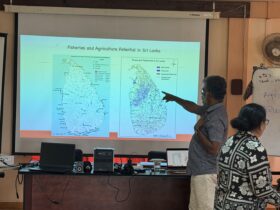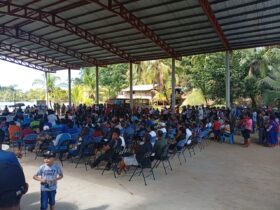[button link=’https://wffp-web.org/2014/08/24/cria-de-camaron-frente-derechos-territoriales-ancestrales-en-ecuador/’ size=’large’ color=’red’ target=’blank’]En Español[/button]
Ecuador is the fifth largest producer of shrimp worldwide, generating over
one billion dollars a year. Ecuador’s fragile wetlands have been devastated by shrimp farming – according to official statistics, the national area of mangroves went from 362,000 hectares to 108,000 hectares. Although the shrimp industry employs 250,000 people in Ecuador, a much higher number of people sustained their livelihoods from the mangroves before the industry grabbed the coastal lands. Mangrove forests can sustain the livelihoods and provide food for up to eight times as many people as the shrimp industry. Entire communities have been evicted and desperate fishermen are now fighting the shrimp farmers in order to reclaim their lands and protect the mangrove forests. “The estuary has become a war zone, and farmers even use packs of dogs and armed militias to protect their farms” informs Lider Gongora from C-CONDEM.
By the Chone river estuary in the Manabí Province, more than 70 families with ancestral ties to their lands making a living from the crabs, honey, shells and other food from the mangrove area formed the Collective el Verdun.
In 1979, a local businessman acquired the wetlands and developed shrimp farms with loans from the Bank of the Pacific. In the process, people of the Collective el Verdun were evicted forcefully and violently from their lands,
and the mangrove depleted. When the businessman went bankrupt in 1997 and abandoned the shrimp farms, the Collective reclaimed its land, and started planting new mangrove trees and crops for their subsistence.
In 2010, the Bank of the Pacific sold the land to another businessman.
He informed the Collective that he considered them invaders on his land and demanded they leave. In response, the Collective demanded a proper investigation, which was undertaken by the government of Manabí. The investigation confirmed their ancestral rights to the territory, and ordered the businessman to grant access back to the Collective.
Following his refusal, the Collective organized a public hearing a year later and asked the Ministry of Agriculture to transfer the property to the community. They made reference to the Ecuadorian Constitution, which stipulates that indigenous communities have the right to keep ownership of ancestral lands and territories and to not be displaced from their ancestral land. The hearing resulted in a court case in 2012, which required the businessman to allocate 20% of the property to the Collective. Even though the businessman’s property rights were thereby still recognised, he once again refused to give back the 20% land. The authorities have not yet enforced the court order.





1 Comment